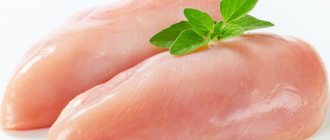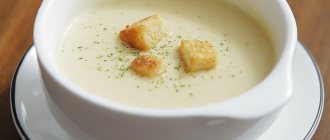Many people calculate the calorie content of the food they will eat every day. For some it is a tribute to fashion, for others they want to lose weight, for others they want to build muscle mass or simply gain weight. Therefore, any food is counted. However, the answer to the question about the calorie content of a particular product, including how many calories are in an egg , is far from clear.
What is a calorie? This is a unit of energy measurement. To measure calorie content, special studies are carried out. They consist in burning the sample under study in a special device - a calorimeter, and measuring the energy that is released as a result of combustion.
It is reliably known that the calorie content of food depends on how it is prepared. After all, every ingredient added to a dish increases its energy value.
Product calculator
Enter the quantity of the product “Eggs with mayonnaise with garnish” to calculate its nutritional value
| Property | Meaning | % of normal | |
| Calorie content, kcal | 251 | 12.55 | 12.55% |
| Proteins, g | 7,2 | 4.67 | 4.67% |
| Carbohydrates, g | 4,4 | 1.6 | 1.6% |
| Fats, gr | 22,8 | 50 | 50% |
How many calories are in scrambled eggs
Let's look at the frying process. Let's take as a basis that 1 raw egg contains about 70 kcal, i.e. 100 g - approximately 120. And already in a chicken product fried in butter - 200 kcal (per 100 grams). Fried in sunflower oil – 170 (per 100 g). Fried without oil - about 120 kcal.
Let's sum up the intermediate result: scrambled eggs from 1 egg (we take the average size of 60 g, fry in vegetable oil) contain about 100 kilocalories, two fried eggs, respectively - 2 times more, i.e. scrambled eggs from 2 eggs - 200, in scrambled eggs from 3 eggs – 300 kcal.
By adding a couple of croutons to scrambled eggs for breakfast, we further increase the calorie content of our food. Croutons fried in any type of oil contain a lot of energy - 380 kilocalories per 100 grams!
Micro- and macroelements in Eggs with mayonnaise and garnish
Eggs with mayonnaise with a side dish contains the following elements: Mono- and disaccharides, Cholesterol, Ash, Starch, Water, Organic acids, Dietary fiber, Unsaturated fatty acids, Sodium, Potassium, Phosphorus, Magnesium, Calcium, Sulfur, Copper, Boron, Aluminum, Iodine, Manganese, Chromium, Fluorine, Molybdenum, Vanadium, Cobalt, Nickel, Rubidium, Lithium, Zinc, Iron, Chlorine.
| Micro and macro element | Meaning |
| Mono- and disaccharides, g. | 1,6 |
| Cholesterol, mg | 177,2 |
| Zola, Mr. | 1,4 |
| Starch, Mr. | 1,8 |
| Water, city | 76,9 |
| Organic acids, g. | 0,3 |
| Dietary fiber, g. | 0,6 |
| Unsaturated fatty acids, g | 1 |
| Sodium, mg | 190,6 |
| Potassium, mg | 216,4 |
| Phosphorus, mg | 112,7 |
| Magnesium, mg | 19,3 |
| Calcium, mg | 34,6 |
| Sulfur, mg | 61,1 |
| Copper, µg | 58,3 |
| Boron, µg | 38,9 |
| Aluminum, µg | 114,3 |
| Iodine, mcg | 7,9 |
| Manganese, mg | 0,0564 |
| Chromium, µg | 3,1 |
| Fluorine, mcg | 26,4 |
| Molybdenum, mcg | 4,9 |
| Vanadium, mcg | 22,8 |
| Cobalt, µg | 4,4 |
| Nickel, µg | 2,3 |
| Rubidium, mcg | 69,2 |
| Lithium, mcg | 8,5 |
| Zinc, mg | 0,4355 |
| Iron, mg | 1,6 |
| Chlorine, mg | 66,3 |
How many calories are in a boiled product?
A boiled product has much fewer calories than a fried product. But the cooking process has its own nuances: you can cook soft-boiled, “in a bag”, hard-boiled. It is worth noting that cooked soft-boiled meat is absorbed most fully by the human body. And the calorie content of raw meat is higher than that of soft-boiled one. Raw (1 piece) – 70 kcal, soft-boiled – about 60 (2 boiled soft-boiled eggs – 120 kcal). Steep – about 70 kcal.
It is worth remembering that if you eat a dish with mayonnaise, its nutritional value will increase: the more you add, the more calories contained in mayonnaise will increase.
Vitamins in Eggs with mayonnaise and side dish
Eggs with mayonnaise and garnish contain the following vitamins: Mono- and disaccharides, Cholesterol, Ash, Starch, Water, Organic acids, Dietary fiber, Unsaturated fatty acids, Sodium, Potassium, Phosphorus, Magnesium, Calcium, Sulfur, Copper, Boron, Aluminum, Iodine, Manganese, Chromium, Fluorine, Molybdenum, Vanadium, Cobalt, Nickel, Rubidium, Lithium, Zinc, Iron, Chlorine.
| Vitamin | Meaning |
| Vitamin B1 (thiamine), mg | 0,08 |
| Vitamin B2 (riboflavin), mg | 0,2 |
| Vitamin B6 (pyridoxine), mg | 0,1 |
| Vitamin B9 (folic), mcg | 6,1 |
| Vitamin C, mg | 6,4 |
| Vitamin E (TE), mg | 9,4 |
| Vitamin PP (Niacin equivalent), mg | 1,9952 |
| Vitamin B12 (cobalamins), mcg | 0,2 |
| Vitamin D, mcg | 0,7 |
| Vitamin A, mg | 0,9 |
| Choline, mg | 82,1 |
| Vitamin A (VE), mcg | 900 |
| Vitamin B5 (pantothenic), mg | 0,5 |
| Vitamin PP, mg | 0,8 |
| Vitamin H (biotin), mcg | 6,8 |
How many calories are in the white and how many are in the yolk?
There are situations when, for medical (or other) reasons, you cannot eat white or yolk. But even in this case it is unreasonable to refuse to use this most valuable source of nutrients. Egg white (raw) contains a substance that can reduce the aggressive effect of gastric juice on the walls of the stomach. In boiled (without yolk) protein, the amount of this substance is slightly reduced. Thus, boiled egg white, whose calorie content is about 40 kilocalories per 100 g, is a super-dietary product compared to the yolk. Boiled yolk contains about 200 kcal per 100 g. The yolk contains a large amount of minerals and vitamins; when boiled, their amount decreases slightly.
In the modern food industry, there are technologies that make it possible to separate a whole product into white and yolk, pasteurize them and package them in sterile containers (PET bottles and bags). This form of products is extremely convenient both for home use and for large-scale food production.
Benefits of eggs
This product is used not only in dietary nutrition for weight loss, but also for medicinal purposes. It has an excellent effect on overall health and has excellent strengthening properties for the human body.
This natural product also has the following benefits:
- the substances contained in the composition perfectly protect the optic nerves and prevent the formation of cataracts;
- components that have a beneficial effect on the circulatory system, strengthen the vascular system;
- lecithin has strengthening properties for memory, affects the speed of thinking;
- stimulates the body's immune defense, preventing many diseases;
- has strengthening properties for bones and teeth;
- Vitamin E in the composition has a beneficial effect on the skin, hair, and helps maintain youth;
- Low-fat composition and relatively low calorie content help you lose weight.
Of course, there are many other foods with similar calorie content. However, it is chicken eggs that are most in demand due to their unusual taste, relatively low cost and the ability to prepare many different dishes based on them.
The greatest benefit will come only from fresh eggs. There are two ways to check this: a fresh egg does not make any sounds when shaken; a fresh egg placed in water immediately sinks; a not fresh egg rises to the top.
Not simple, but golden
In any kitchen in the world, the egg is considered almost indispensable. Their special properties allow them to be used in any national dish, be it a main meal or dessert.
In addition, eggs have their place in dietetics. Health nutrition experts have confirmed that regularly eating this product, both raw and processed, has health benefits. And this is no wonder! After all, one egg contains more than a dozen microelements and a whole range of vitamins and minerals, including iron and calcium.
Therefore, information on how many calories are in a boiled egg is quite useful, especially when creating an individual nutrition system. The average weight of a homemade hard-boiled chicken egg is 55 grams.
The structure is typical; it contains a protein part and a yolk mass. It is known that the former is 100 percent absorbable in the body, unlike the protein components of fish, meat or dairy products. This is especially important when building mass in athletes or patients with malnutrition.
Overeating problem
Unfortunately, the habit of excessive consumption of food, or simply overeating, has become stereotypical and typical in society. That’s why you can often see obese people on the street.
The reasons for this condition may be a lack of control over the calorie content of consumed foods. After all, many people have no idea how many calories are in a boiled egg, especially against the background of a decrease in the amount of physical labor. Likewise, poor food, depleted in minerals and vitamins, thereby contributes to disruption of all types of metabolic processes in the body, gradually leading to the accumulation of excess deposits at the waist.
And since we’re talking about eggs, let’s at least figure out this issue together.
Composition and nutritional value
Today, there is a lot of disagreement among both doctors and nutritionists regarding the addition of eggs to the diet. Some say that by consuming them you can eat without gaining weight, while others claim that this product is rich in bad cholesterol. Many questions arise about this. Let's try to find answers to them.
Even 15-20 years earlier, nutritionists argued that eggs were harmful due to their composition and the amount of cholesterol they contained. Today, this opinion has changed dramatically. This decision was influenced by a more thorough study of the product’s composition.
The approximate weight of one chicken egg is about 45 grams, and the protein contains:
- about 87% liquid;
- 11% protein;
- only one percent carbohydrates;
- minerals 1%.
The yolk is slightly different in its constituent indicators:
- half of the ingredients are water;
- fats in the amount of 30-31%;
- 17% protein;
- 2% minerals.
The composition is rich in such useful elements as calcium, phosphorus, iron, as well as potassium, sodium, zinc and selenium.
In addition, it contains many different vitamins of group B, A, D, E, K, Pp. Many nutritionists advise eating two boiled eggs every day in the morning, as they energize, invigorate and, of course, perfectly kill hunger. How many calories are in an egg depends on many factors. What affects this and how to reduce the number of calories?
About myth and reality
Conflicting information was spread about the yolk, even to the point of provoking the development of oncology and autoimmune processes, which was especially zealously discussed abroad.
It was also assigned a major role in increasing atherogenic blood lipids, which is an unfavorable prognostic factor for deteriorating health. However, these misconceptions have now been refuted. It has been proven that the yolk does not cause any serious abnormalities and does not negatively affect metabolism.
The most interesting thing is that how many calories are in a boiled egg can only be approximately calculated. It all depends on the weight and origin of the product, that is, on what the laying hens were fed.
Eggs and diet food
Eggs are one of the natural foods included in the list of low-calorie foods. This product is often included in many diets and is often used for medicinal purposes.
Studies have shown that people who eat two boiled eggs every day in the morning, on average, reduce the calorie content of their diet per day by about 300 kilocalories.
Nutritionists recommend consuming this product at least 2-3 times a week; this will help not only lose weight, but also strengthen your body. There are certain diets for weight loss that include a distinct number of eggs per day. Eggs do an excellent job of normalizing metabolism in the body.
Standards of use
If your cholesterol level is normal, you can eat one egg daily. With this dosage, the body will be replenished with the necessary beneficial components. If cholesterol levels are elevated, it is recommended to reduce the amount of product by eating 2-3 units per week.
If we talk about children, then the yolk is introduced into complementary foods around the seventh month of life. And at two or three years old, pediatricians advise children to eat 2-3 yolks for seven days.
Remember that eggs are usually found in many dishes. This is especially true for those who lose weight through diets, calculating the number of calories eaten per day. Thus, eggs are found in mayonnaise, baked goods, cutlets and other popular dishes.
Calorie content of fried egg (1 pc.)
How many calories will there be in a chicken egg if it is fried? Indeed, after heat treatment the energy value of the product increases. However, the specific value depends not only on the size of the egg, but also on the chosen cooking method. On average, the calorie content of one fried chicken egg is 125 kcal, but this figure is valid for 100 grams of food.
Photo source: shutterstock.com
It is equally important to consider that various vegetable fats are usually used when frying. Minimum values can be achieved by using olive oil. Then the “weight” of the finished dish will be 230 kcal per 100 g. If you use standard vegetable oil, the figure will increase to 240 kcal.
If you fry eggs on fat-containing products, the energy value of the finished dish will be higher than 255 kcal.
Based on the data obtained, we can say that fried eggs are not the easiest product. Such dishes are not suitable for dietary and low-calorie nutrition if butter, vegetable, olive or other oils were used during their preparation.
ABC RECOMMENDS
How many calories are in a boiled egg: table and BJU
Calorie content of 1 fried egg without oil
The safest way to fry eggs for your figure involves using a non-stick frying pan and avoiding oils.
Photo source: shutterstock.com
It is very easy to achieve the minimum energy value: just fry an egg without oil. A non-stick frying pan needs to be well heated. Break a whole chicken egg (1 piece) directly into a hot frying pan and fry until done.
The calorie content of the finished dish per 100 grams will be 125 kcal, and the fat content will not exceed 9 grams.
Calorie content of 1 fried egg with butter
But most often this product is fried with the addition of sunflower oil, which ultimately increases the energy value of the dish. But this indicator can be adjusted. Please note that the minimum calories in this delicacy are 245 per 100 grams of weight. But each subsequent small spoon added, the volume of which is about 10 ml, increases the nutritional properties of the dish by approximately 90 units. As a result, its calorie content can fluctuate between 240-360 kcal.
If you cook an omelet with 2 eggs, the nutritional value of the dish will be about 140 kcal. But a lot depends on the use of additional components.
You can learn how to fry chicken eggs without a drop of fat from the video:










